Maxxe Albert-Deitch's Blog, page 2
November 15, 2024
The World Is On Fire. These 10 Books Make Me Feel A Little Bit Better.
I know, I know, everything is terrible. I’m not arguing that point. And lots of people, myself included, are struggling with which books to reach for at the moment. The romances feel too trite and low-stakes for the world we live in. The dystopias feel too real. So where does that leave those of us who rely on books for escapism when the world is descending into madness?
These ten books have made me feel a little bit better in recent days— maybe they’ll help you, too.
1. Homer’s Odyssey (specifically Emily Wilson’s translation)
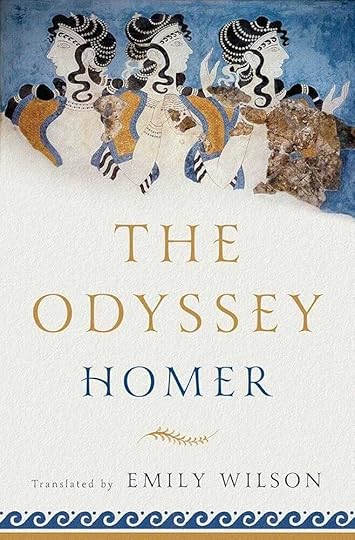
It’s somewhat comforting to remember that humans have been around for longer than 2,024 years. And we’ve been making art and telling stories that whole time. And, in the case of a piece like Wilson’s translation of The Odyssey, we’ve been finding new interpretations and new versions of those stories for over a thousand years. Which indicates that even under poor circumstances, we’re unlikely to stop telling stories and making art and developing history. Human history is pretty vast— it’s nice to have some solid proof that it hasn’t been pointless.
2. Station Eleven, by Emily St. John Mandel
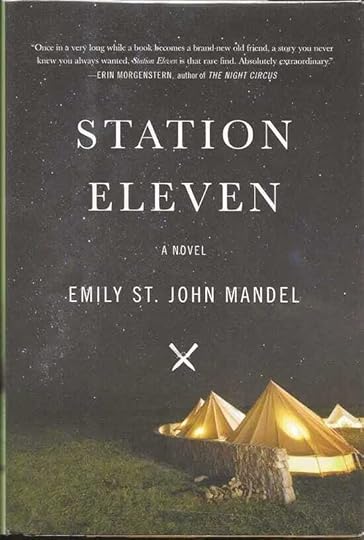
I love this book for so many reasons. It remains deeply eerie to me how prescient this book was for its time— it was written before the 2020 pandemic, before the Trump-era attempted book bans, before Project 2025, before SpaceX. And yet. It engages and discusses the value of art and music as an explicit juxtaposition to religious fanaticism— and does so deftly, in a way that continues to make sense in a world that rapidly moves towards extremes.
3. The Lord of the Rings , by JRR Tolkein
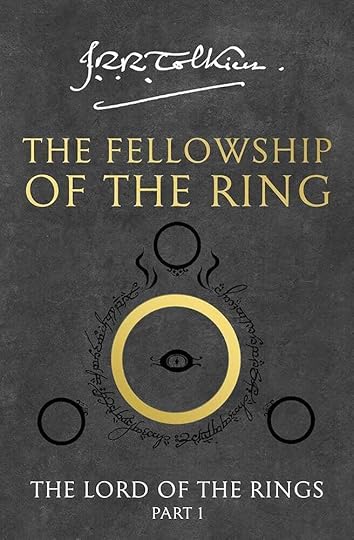
If you know me, even a little bit, you already knew that these books would be on this list. These books are, fundamentally, about hope in the face of darkness, about individual choice and conviction being the traits that define a society in its most challenging days.
4. A Gentleman in Moscow , by Amor Towles
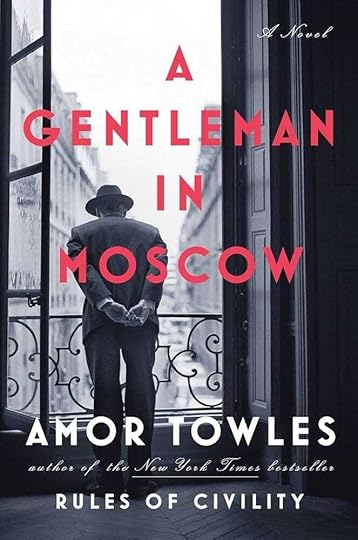
Among other things, I find historical escapism in the context of a luxury hotel and a revolution quite appealing. But what makes this book so special is its focus on individual relationships and perhaps more importantly, on dignity and endurance.
5. The Redwall series, by Brian Jacques
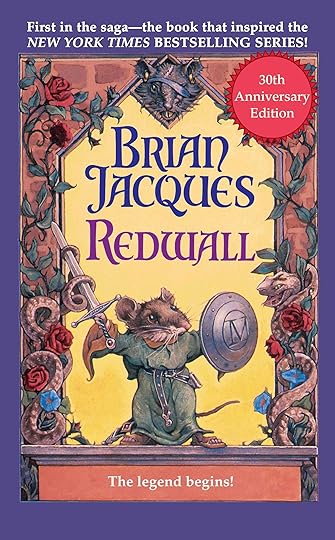
Listen, I really just want to disappear into the woods and eat some delicious extravagant food and maybe do a battle with a sword every now and then. Okay?
6. Gulp, or whatever topic you’re most interested in by Mary Roach
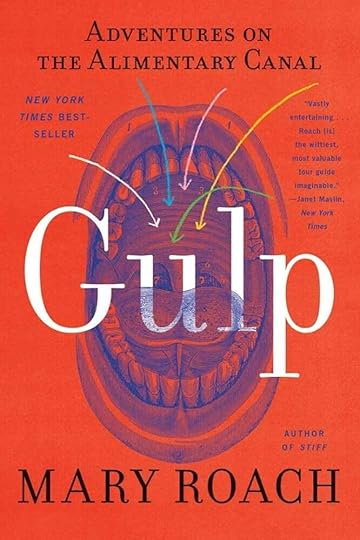
There’s this idea that we all have to have hope, right now. And that hope is what will keep us going. But you know what I’ve realized from my own experiences with mental health issues over the years? When I don’t have hope, I do have curiosity. There’s always something new to learn, even if there’s not much new to look forward to. And that’s where Mary Roach’s books are exceptionally helpful— she picks through tiny little very complicated microcosms of earthly existence in ways that make them approachable and interesting.
7. The Little Prince , by Antoine de Saint-Exupéry
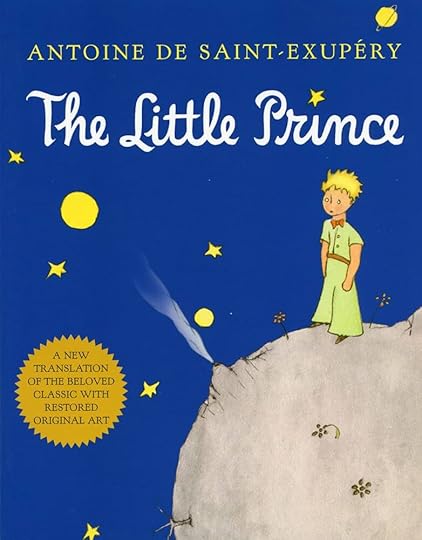
This book is just comfort in a picture book. Read it in English or French, it doesn’t matter. It’s simple and profound and necessary.
8. The Book Thief by Markus Zusak
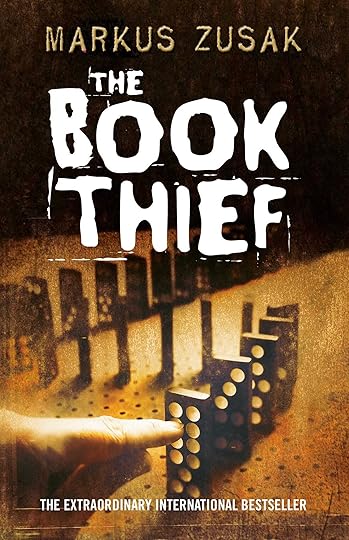
Maybe a little too close to our current reality, I know. But important to think about, and important to remember: bad things have happened before. And we (humans) have survived them.
9. Dog Songs by Mary Oliver
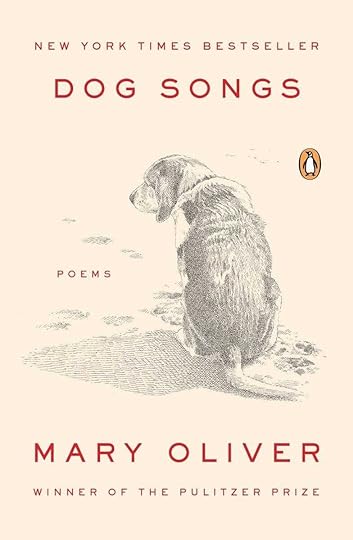
I’ve seen lots of people recommending Devotions in recent years, but Dog Songs is by far my favorite Mary Oliver collection. Dogs make life better— more complicated, simpler, sillier, sadder, sweeter— and I’ve never read anything that summed it up more than this poetry collection. And since I’ve spent the past week hugging my dog at every opportunity, it seems like a valid recommendation.
10. Project Hail Mary , by Andy Weir
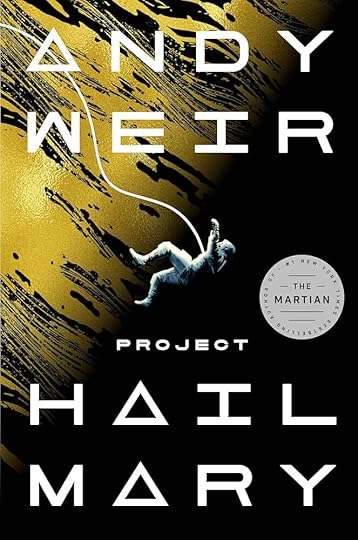
Because sometimes I think we need a reminder that humans are, ultimately, capable of goodness. Capable of recognizing fault and folly, and making change. This book is so wholeheartedly hopeful, and in ways that make me genuinely believe we can collectively be better. Also, the anthropologist in me likes this story.
So. Hope, curiosity, and endurance. Hopefully you can find some solace in at least one of the three as we venture into the days ahead.
November 8, 2024
Once Upon A Weekly Update- November 8, 2024

Look, I’ve started many of the past few days by saying “I don’t like today.” Or realizing that “how are you” and “how’s it going” are TERRIBLE conversation-openers when no one I know or work with is doing well in the wake of Tuesday night’s news (my day job is communications work for a progressive policy organization. We are not having a good time). But the world keeps turning, the sun keeps rising, and we all have to continue on with our lives as though the axis of the earth doesn’t feel like it’s shifted under our feet. So, with that in mind, here’s a slightly different take on my usual “what I’m reading, writing, and enjoying” update.
What I’m Reading
I spent the first half of the week rereading favorite books— Babel, by RF Kuang. Red, White, and Royal Blue by Casey McQuiston. The Grace Year, by Kim Liggett. His Name Is George Floyd, by Robert Samuels and Toluse Olorunnipa. You know, books that have absolutely nothing to do with our political landscape whatsoever. Then I spent two days being exceptionally irritated with people on the internet claiming that “book communities don’t need to be political,” and that their pages were a “safe space for everyone no matter who you voted for.” Never mind that one party would like to ban books. And the books they’d like to ban are, in many cases, romance novels. Never mind that all books are political. Also, I don’t think I want my page to be a safe space for white supremacists. I stand by that. And then I decided that I wanted some escapism. So I finished up reading Emily Wilde’s Map of the Otherlands, by Heather Fawcett, which I thoroughly enjoyed, and then moved on to what I was really after— something a little dark, preferably of the vaguely maudlin, thriller-y sort. In short, I wanted to redirect some of the adrenaline and stress that hadn’t left my body since Tuesday night, and reading about other people handling (and surviving) much more immediately scary things than my world currently contains felt like the way to go about it. So I dug into If We Were Villains, by ML Rio, and then immediately followed it up with Death at Morning House, by Maureen Johnson. If anyone’s got suggestions for what to read next, I’m all ears.
How My Writing’s Going
Welllllll…. I got word at the beginning of the week that Kindle Vella, where I’ve been serially publishing The Illyria Project, is going away at the end of this month. Which is unfortunate not just for my little sapphic Dark Academia Twelfth Night retelling, but also for my holiday anthology plans!
Now feels like as good a time as any to tell y’all that I am working on an “advent calendar” of sorts; a chapter-a-day-til-Christmas serial release book. The vibe is very much Delicious-in-Dungeon-meets-Great-British-Bake-Off and all the characters are trying to save the Winter Festival in their monster-overrun hometown. And some of them maybe are falling in love in the process. Each chapter gets a recipe to go with it, including some that have been sent in by fans and followers (which is awesome!). I’m having a ton of fun writing/editing it. The trouble is…
You guessed it. I had been planning on releasing it on Kindle Vella. Which, by mid-December, will no longer be an option. So now I’m back to the drawing board for release plans. Where would y’all prefer those chapters to come out? Here on Substack? All at once, in book form, on Kindle Unlimited? I’m really up for anything.
Something Fun
I’ll be fully transparent; this has not been a week for a lot of fun. I will say that I’ve been leaning into comfort and coziness a great deal: going for long walks outdoors with my dog, taking deep breaths in the autumnal (but for some reason, 80-degrees-the-week-after-Halloween) weather. Spending time in coffeeshops with friends. Wandering around Barnes and Noble with my partner. Eating soup (specifically a white-bean-and-Impossible-sausage soup that I made and froze a week ago). In general, my current logic is that if a hobbit would do it, I should too. Which, if I’m being honest, doesn’t SOLVE all of my problems, but…
The way I see it, it’s like any other super-upsetting thing, whether that’s a breakup or a bad grade or a minor car wreck. Getting up and taking a shower and feeding yourself won’t necessarily solve the root problem, but it’ll sure as hell make you better-equipped to handle it later on.
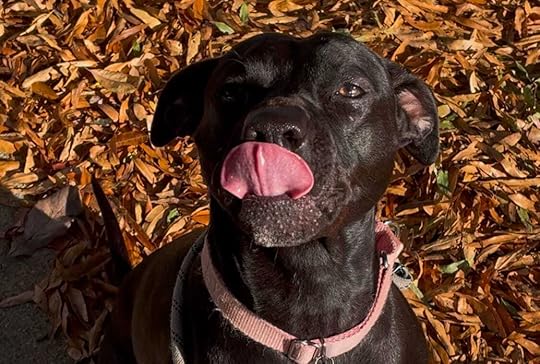
^ Just for good measure, here’s a picture of my dog. She’s very cute.
Gemma Tate- Books, Writing, and More is a reader-supported publication. To receive new posts and support my work, consider becoming a free or paid subscriber.
October 31, 2024
Happy Halloween- Here's a Spooky Book Roundup

Happy spooky scary skeletons season to all those who celebrate! Unfortunately, I currently feel like the world is just as spooky and anxiety-inducing as anything a horror movie or book could conjure up at the moment. And the tropes that a lot of traditional horror stories rely on feel REALLY gross right now, because they rely on racist tropes, or dug-up Native burial grounds, or outdated stereotypes about indigenous practices, or just straight-up misogyny to have a plot. And I find that lazy! If you’re going to have racism in your book, then at least have the guts to make that the scary thing! If you’re going to have a weird obsession with virginity or purity, then THAT IS THE JUMP SCARE. So with that in mind, here’s a quick roundup of some of MY favorite spooky/creepy/seasonally-appropriate books to curl up with this Halloween.
Girls Save the World in This One, by Ash Parsons
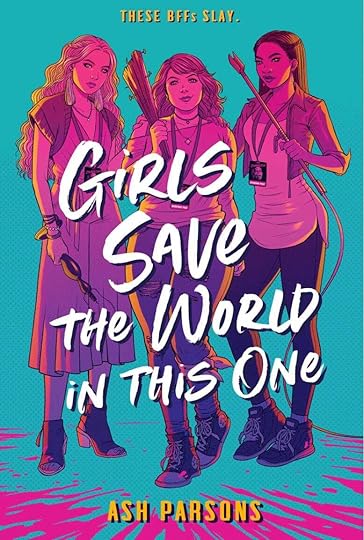
I mean, it’s in the title. Girls do in fact save the world in this one. Also, it’s set just outside of Atlanta, which is appealing to me, as someone from just outside of Atlanta. It plays into the fun and creepy aspects of fan culture, leans into what makes shows like Supernatural and The Walking Dead so attractive, and also it’s FUN while also being adrenaline-inducing and spooky. Such a great time.
Ring Shout, by P. Djèlí Clark
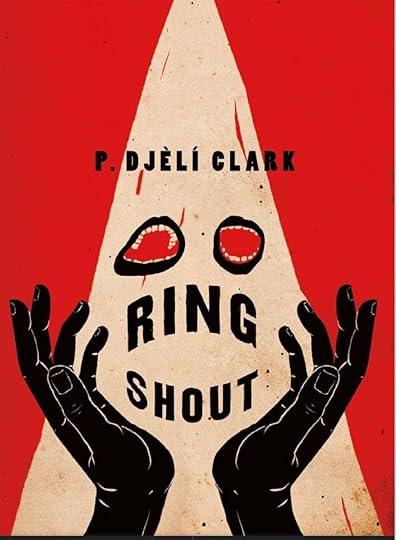
I read this book in 2020, when I was in fact deeply afraid for democracy in the US (I still am!) and was having A Lot of Feelings as a historian about just how deep the roots of racism and fascist leanings run in some pockets of American culture. This book was everything I needed— it’s basically Buffy the Vampire Slayer but the vampires are more like ghouls and also they’re the KKK. Highly recommend.
Rules for Vanishing, by Kate Alice Marshall
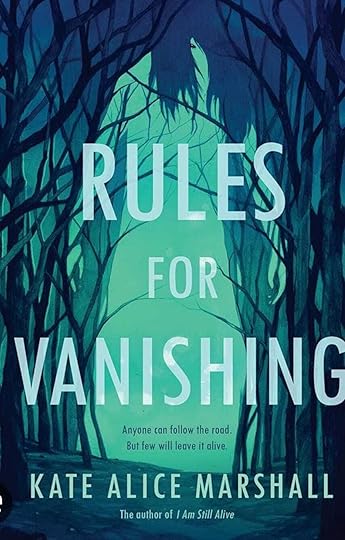
This book is just genuinely creepy and spooky and scary. I read it when I was home alone on a dark night in college, which for the record was a TERRIBLE idea. It’s kind of like the Blair Witch Project but crossed with an excellent ghost story. I love any kind of story that clearly sets up rules and structures for the characters, so when the rules get broken you know exactly how bad the consequences will be, and you have to watch it happen anyway. This book is delightful and escapist and also kind of chilling. I loved it.
Cryer’s Cross, by Lisa McMann
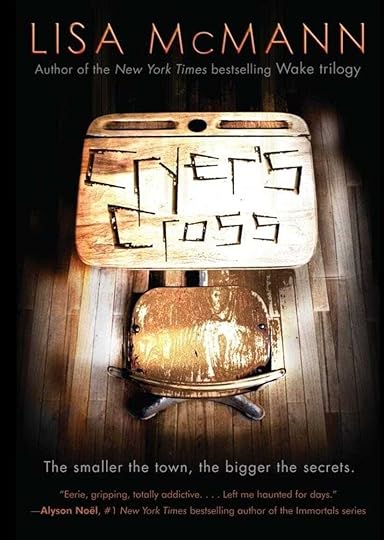
Cryers Cross was one of the first horror books that I can remember seeking out as a young adult— (the others are Coraline and The Girl with All the Gifts, both of which are also on this list). It’s a pretty simple creepy ghost story— but it’s also the first book I can remember reading that intentionally dealt with the horrors of state-run indigenous boarding schools in the US. Also, I LOVE the way McMann writes about anxiety and OCD — there aren’t many books that feel true to my own experience with Mental Health Stuff, but weirdly this is one of them? In any case— my affection for this book may be partially based in nostalgia, but I stand by it.
Frankenstein , by Mary Shelley
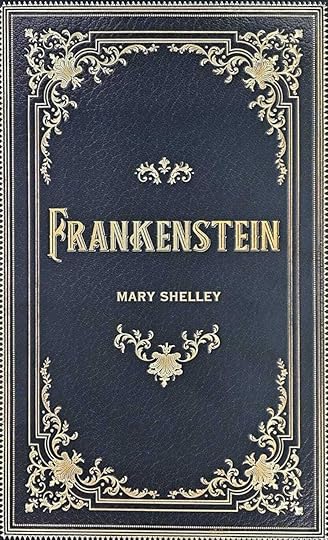
I’m a Mary Shelley girl. I think most of y’all know that already. Also, it’s just such a neat fact that she wrote this for a spooky story contest along with Lord Byron, her husband Percy, and John William Polidori. That night resulted in Mary Shelley essentially becoming the second prominent voice in science fiction history (the first being Margaret Cavendish, Duchess of Newcastle-upon-Tyne, who wrote The Blazing World back in 1666), and Polidori and Byron writing Vampyre, which was the jumping off point for vampire fiction from Dracula to The Vampire Diaries. But also I really genuinely love Frankenstein on its own merits— its beautiful prose, Shelley’s careful manipulation of the reader’s sympathies, the painful dynamic between radicalism and hope, between violence and shame. It’s just So Good.
Coraline , by Neil Gaiman
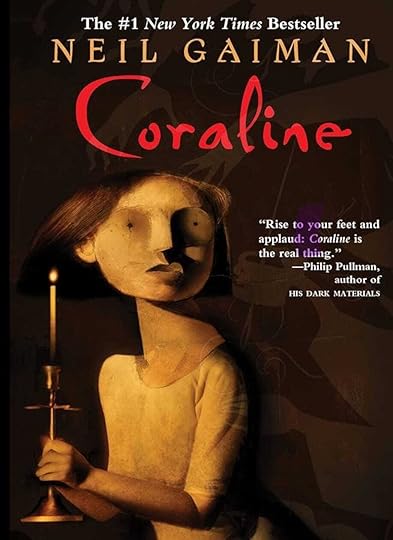
I’m pretty sure this WAS the first horror book I ever read all by myself. I’m also pretty sure I checked it out from the public library after my mom told me more than once that I probably wouldn’t like it'; I’d find it too scary. Funny enough, she was sort of right— I didn’t mind Coraline all that much as a child, but it freaks me the hell out now as an adult. It’s also one of the first books that I ever really re-read and went back to, looking for symbolism and foreshadowing and all of the cool little tricks that authors can do to make you think harder about how a book is put together.
I know we all are having some Feelings about Neil Gaiman and how he conducts himself in his personal life (and how that translates to the ways that he writes about power dynamics between young women and older men in his books), but Coraline has been foundational enough to my process as a reader and a writer that I’m keeping it on my list of horror recs, at least for now.
The Girl with All the Gifts, by M.R. Carey
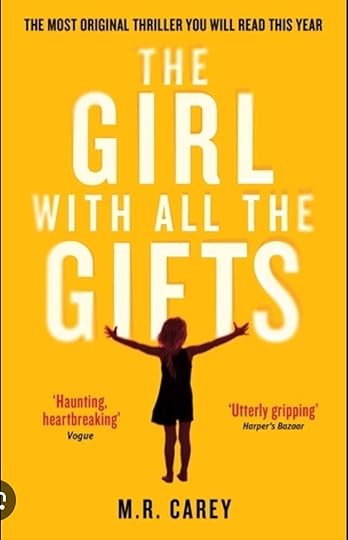
This one is another first for me— in this case, the first Scary Book that I ever bought with my own money. I didn’t even know if I would like it, I just knew that my high school librarian had recommended it and that it had been blurbed by other authors I liked. It was a huge break in genre for me— I was not a horror reader, I did not like books with blood, guts, or gore, and I had seen exactly two horror movies ever and didn’t like either of them. This book changed SO MUCH for me in terms of how I perceive the genre. It shifted my understanding of what horror can be, and opened up my horizons significantly as a result. Also, I’d never have picked up The Last of Us (the games or the show) without it, and I’m really grateful that I did!
Something Wicked This Way Comes , by Ray Bradbury (technically part of the Green Town trilogy)
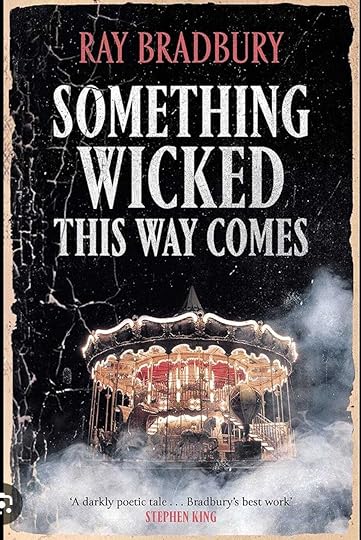
I mean. It’s creepy as hell. It’s magical. The prose basically leaps off the page. It’s about a malevolent carnival (sort of). It’s set in late October. It’s basically the perfect Halloween book.
Rouge , by Mona Awad
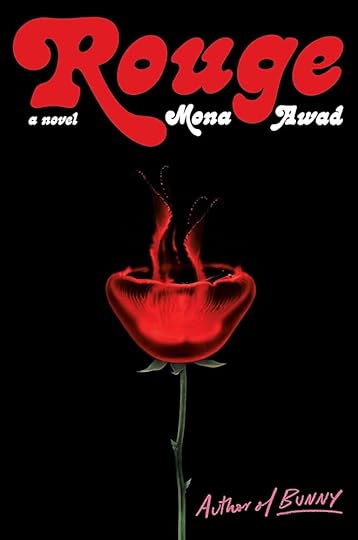
Everyone talks about Bunny. Including me, I talk about it a lot. But I LOVED Rouge. Awad is so creative with how she handles her narrators— unreliability, shifting voice, introducing and removing influences from the narrator’s internal voice. It’s just so, so well done. And Rouge is especially well-executed— Awad handles grief, mental illness, the toll that beauty expectations and the price of achieving them can take on the feminine psyche, So. Well. Also, did I mention it’s spooky? Because it is.
(Also, weirdly, it reminds me of a grown-up version of the second The Name of this Book is Secret book. Probably not Awad’s intent, but here we are)
Mister Magic, by Kiersten White
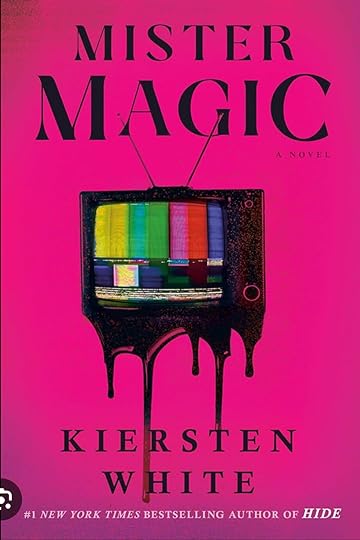
On the off-chance that you’d like a little bit of religious deconstruction to go with your creepy books, Mister Magic makes this list in so many ways. It’s just escapist enough that I can stomach reading (or rereading) it in the current conditions of modern-day-America, but it’s relevant enough to turn my stomach. It helps that I already like Kiersten White’s writing (And I Darken is one of my favorite pieces of historical fiction of all time, and Paranormalcy was the book that introduced me to paranormal romance), but Mister Magic is by far the creepiest of her books and the one that leans the most into what makes actual reality so scary.
How are you planning to spend your Halloween? Personally, I will be roasting up some pumpkin seeds and watching movies on the couch while putting the finishing touches on a costume for a party I’m attending this weekend. Maybe I’ll even pick up one of these books for a reread— depends on how much sleep I want to get, I suppose.
Thanks for reading Gemma Tate- Books, Writing, and More! This post is public so feel free to share it.
October 26, 2024
Once Upon a Weekly Update- October 25, 2024
October 25, 2024

What I’m reading:
I mentioned it in last week’s update and in the Dark Academia Roundup— I read Emily Wilde’s Encyclopaedia of Faeries, which I (predictably) loved. It’s everything I like about anthropology (which, incidentally, I hold a degree in) and academia and also SCARY FAERIES. Not sparkly little pixies, not yassified elves, but fae that are complicated and varied and nuanced and that have the capacity for absolute horror stories. I had a great time. I will say- this book reminded me of something, and I can’t quite put my finger on what— I felt like I had read these faeries before, somehow. I keep thinking about it, and I know it’s not:
The Fairy Bargains of Prospect Hill by Rowenna Miller
Tithe or The Cruel Prince by Holly Black
Jonathan Strange and Mr. Norrell by Susanna Clarke (though the vibe is in some ways very similar!)
Lords and Ladies by Terry Pratchett, though again, the vibe is similar
But I can’t figure out what it IS and it is bothering me so very much. If you think you know what it might be— the aesthetics, the descriptions of the fae, the negotiations between Emily and the King— PLEASE, let me know in the comments.
In other news, I also read An Academy for Liars, which I quite liked. I will say, it felt a little like the author took a trip to the trope store and bought bits and pieces off the shelves to assemble the book (secret magic school, special dorm of special students within magic school, mind control class, secrets within school) BUT for the most part that didn’t bother me. At its best, it reminded me of the best parts of Ninth House and the Scholomance trilogy (A Deadly Education). At its worst, it reminded me more of Jonathan Stroud’s Bartimeus. It’s probably not going to earn a spot on my “all time favorites” shelf, but I had a good time and the suspense of the last few chapters kept me up past my bedtime to finish it.
How my writing is going:
I had a shockingly productive day earlier this week, in which I wrote and uploaded not only a new chapter of my current ongoing fanfic (A Gathering Storm) but also a new chapter of The Illyria Project, my serially-updated sapphic slow-burn dark academia Twelfth Night retelling.
I also got to go back and edit the chapter of the Much Ado About Nothing project (yes, I like Shakespeare a lot) in which Beatrice tells Ben to “kill Claudio.” Always a good time!
Something fun:
I swear I do fun things that are not just watching TV— but this week, my fun update is absolutely that I watched the end of Season 3 The Legend of Vox Machina. And y’all, it’s so good. I actually like the vast majority of the changes they made from the original gameplay— the Percy twist, cutting the Bard’s Lament, Ripley existing past the Whitestone arc, Zerxus (with Luis Carazo as the voice!!)— and getting to watch an adaptation of something I watched and know well while being genuinely surprised each episode was such a treat.
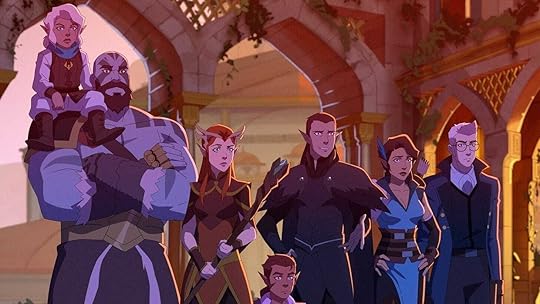
And, still in the TV realm of things, my partner has been watching The Good Place for the first time and finally finished it last night. I’ve watched that show all the way through four or five times now, but I always skip the final episode because it makes me feel WAY too many things, and I can’t watch it without crying at least twice. And you know what? Last night was no different. It’s just so, so well done. Jeremy Bearimy, baby.
And that’s it for me— I hope you all have a cozy final week of October, and I hope you’re doing your best to protect your peace in this final week of pre-election insanity.
~Gemma
October 22, 2024
I’m a Dark Academia Connoisseur— and Some of Y’all are Defining the Genre Wrong
Listen— I LOVE a good Dark Academia book. The whole aesthetic in general, really. I was a prep school kid. I went to college at the kind of institution that has as many ghost stories as it does students. I went to grad school at a university older than the United States. I’m a history person. I love a good piece of Gothic lit as much as the next person, and I LIVE for a good flouncy skirt and collared shirt combo. So yes, I’m the target audience for the genre.
AND. Some of Dark Academia’s most devoted following, especially in spaces like BookTok, lack an in-depth understanding of what the genre actually is.
Dark Academia isn’t just a book that takes place in a school (I love Vampire Academy but if I see one more post describing it as Dark Academia I might lose it). If you’re reading DA, it should have the hallmarks of the aesthetic— ivy-covered walls, dusty libraries, Oxfords and boots, a romantic lead who looks a little like Milo Thatch or Evie O’Connell-- AND, there should be something broken underneath the foundations of the story. Something rotten, bloodstains seeping into the ground underneath the ivory tower where the story takes place. And that’s the point. DA is a genre that takes place within a system of academia, and academia itself is built on empire and colonialism— anyone who’s spent time in a graduate program (especially a humanities graduate program) can tell you that. So to get Dark Academia, you should be engaging with an inherently unfair system, a system that forces conversations about classism and elitism, a system that allows for creativity but only within the very specific confines of research guidelines and the structure of classes and citations and tenure tracks.
SO, with that in mind: here are some of my favorite Dark Academia book recommendations:
1.
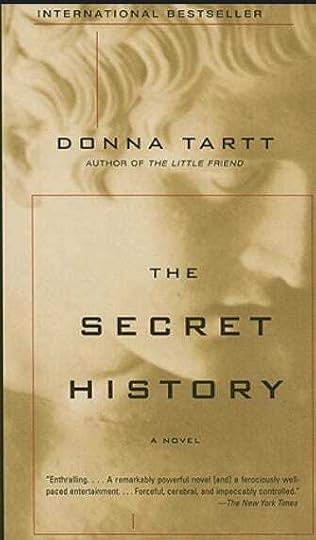
The Secret History is the blueprint for a reason. Class issues? check. Discussion of ivory tower elitism and sacrifice? check. Delusion and horror? Yep. Aesthetics? Beyond yes.
2.
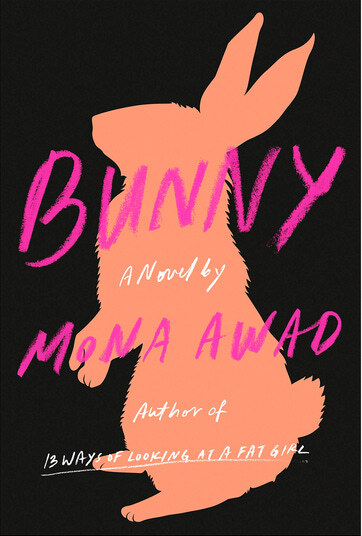
Bunny is a favorite for me specifically because of how categorically weird it is. Everyone who’s ever taken and enjoyed a college or grad level creative writing class should read this book.
3.
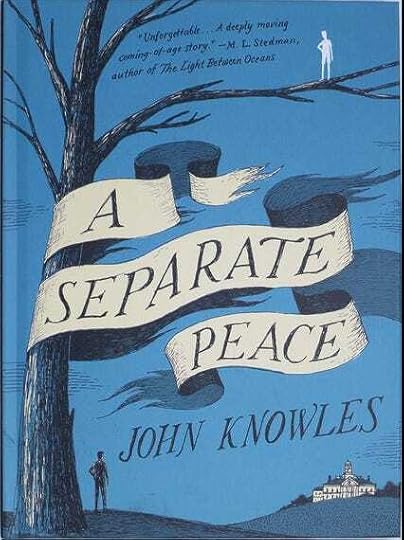
A Separate Peace is one of those books that I never expected to stick with me as much as it did. It was assigned reading in 8th grade. It wasn’t the first coming-of-age book I ever read. But it’s a really excellent discussion about morality and patriotism, all through the lens of an all-boys school during World War II. My only real criticism of this book is that it’s all about men and boys— BUT, in some ways, that makes it all the more important. Because it’s also a discussion about intimacy and codependency, and it’s important that we talk about men having emotions beyond the stoicism of anger and rage! (and it’s pretty easy to read it as a piece of gay literature, if you want)
4.
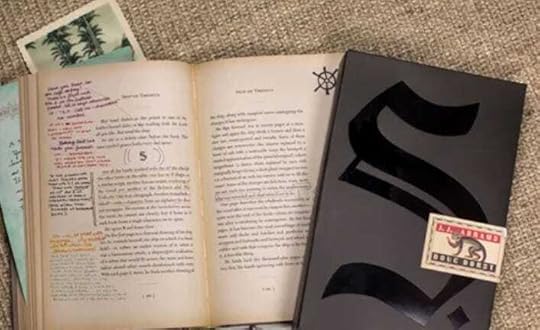
S/Ship of Theseus is one of those books that blows your mind the first three times you read it. It’s pretty darn close to a perfect book for me. It’s the book, Ship of Theseus by VM Straka. But it’s also the story that gets scribbled in the margins, an epistolary tale of Jen and Eric, who pass the book back and forth and leave messages in between the pages. If you’re the kind of person who likes to highlight passages in your books, or who considers margin notes the best kind of love story, this one is for you.
5.
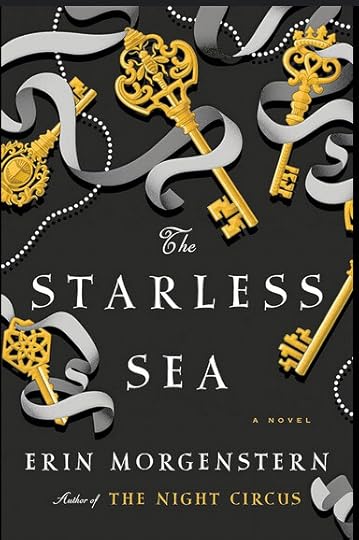
The Starless Sea! It’s a book about stories, and what makes a story, and how people become stories and how stories leave their mark on people. And let’s not forget that the whole book starts because of an unmarked book in a library. This is a book tailor-made for people who wish they could move into a library and never leave— even if the library is crumbling around them.
6.
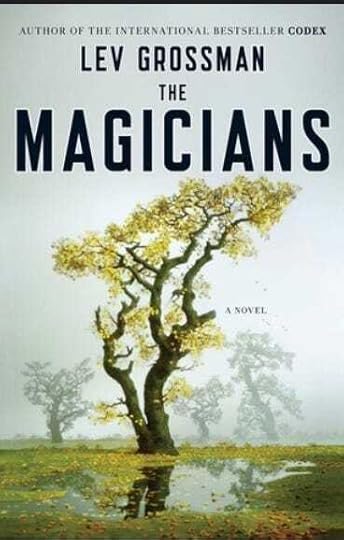
The Magicians is basically just Narnia for depressed grown-ups who went to grad school. As a depressed grown-up who went to grad school, I adore this series (sliiiightly less love for the narrator, I’m not really a Quentin Coldwater fan, but it’s worth it, I think)
7.
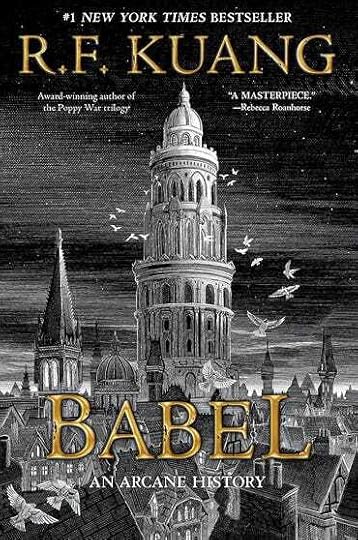
Babel is one of those books that I will probably never shut up about. Maybe I’m a little biased— I really love conversations about colonialism and empire and how it’s shaped academia, and I also really love linguistics and conversations about linguistic development— and I know I’m a sucker for a good magic system. But this book was easily my favorite book of 2022, and I still think about it probably once a week, so into this list it goes.
8.
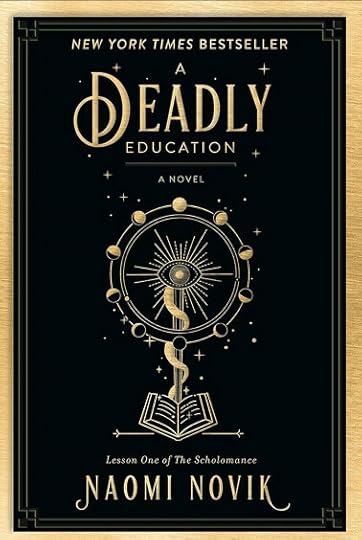
A Deadly Education/the Scholomance series: it’s magic school, but the school is trying to kill the students. And Naomi Novik wrote it. I feel like I don’t have to say anything else to convince you.
9.
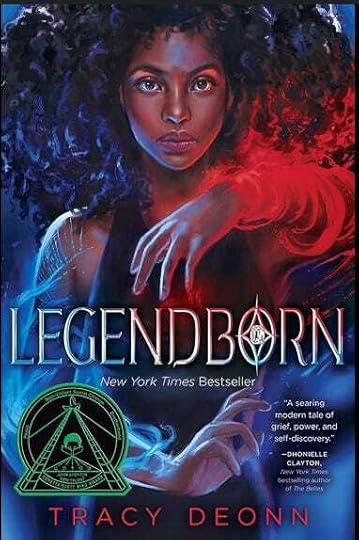
Legendborn starts with an excellent premise (Arthurian knights of the round table, but several generations descendant and operating as a secret society at UNC) and then builds on it in some really interesting ways (racial violence and kinship bonds, claimed and unclaimed heritage, etc). It’s close to a perfect book. Highly recommend.
10.
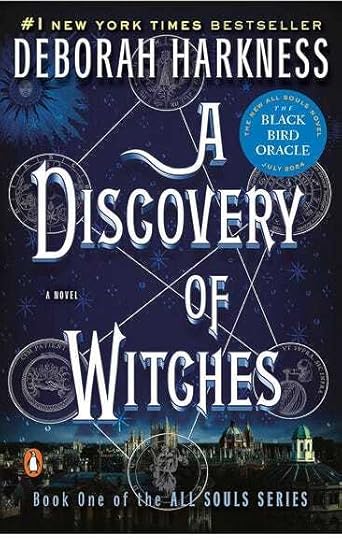
I don’t really think of A Discovery of Witches (All Souls series) as an academia book, dark or otherwise. Or at least, I didn’t used to— until I recommended it to people who were looking for an interesting supernatural romance and every single person I recommended it to took issue with the pacing, the fact that it didn’t really follow romance rules, and the fact that both of the main characters spent WAY too much time wandering around a library talking about citation systems. Which… fair. And the author also doesn’t class it as a romance— she’s a historian, and that’s probably why I like her books so much. Also, the first book does largely take place at Oxford and in French chateaus, which is… well, on-brand.
11.
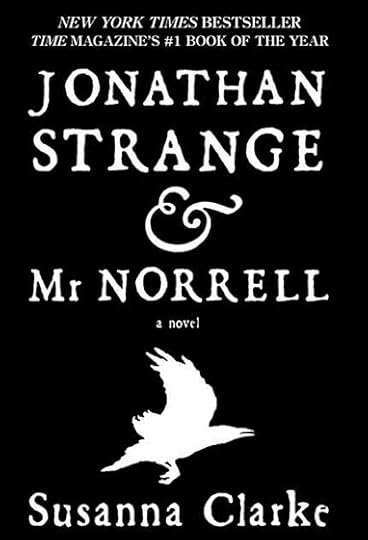
Jonathan Strange and Mr Norrell is not classroom/school Dark Academia, it’s old-school society-men-with-time-and-money-and-mad-scientist-impulses Dark Academia. And I LOVE it. Also, it has a scary fairy— and I love a scary fairy (I’m tired of fairies being either cute and sparkly, or just vaguely yassified elves).
On this note- I did just finish reading Emily Wilde’s Encyclopaedia of Faeries. I really, really liked it. It may well end up being added to this list. BUT, I’m not a thousand percent sure it’s a Dark Academia book. Academic in structure and nature, yes. But a critique of academia itself? I’ll have to read the second book to be sure. But never fear, I’m enjoying it greatly and will figure out what category to shelve it in eventually!
Gemma Tate- Books, Writing, and More is a reader-supported publication. To receive new posts and support my work, consider becoming a free or paid subscriber.
October 15, 2024
Once Upon a Weekly Update
October 25, 2024

What I’m reading:
As usual, I’ve probably spent too much time with my nose in a book (realizing that I can read while on an elliptical machine without getting motion-sick was a game-changer). Between last week and this week, I read:
The Last Word, by Katy Birchall (very basic literary rom-com about a magazine writer who’s stuck working with her old rival. Give me rivals-to-lovers any day, especially if it’s about two people who are both competent and witty and smart. I had a great time)
Just Add Water, by Katie Ledecky (I love a good well-written sports memoir. Did Ledecky have anything new or revolutionary or groundbreaking to say about her sport or her success in it? Not really! But I basically grew up on a pool deck, and many of my best friends are from the swim/dive world, and it’s really great to see that Ledecky loves the sport for the same reasons that they all do)
The Princess and the Grilled Cheese Sandwich, by Deya Muniz (Just absolute silliness. Cheese and queer joy. Excellent cheese-based names. Cute illustrations, too)
And I’m about three chapters into Emily Wilde’s Encyclopedia of Faeries, by Heather Fawcett, which approximately a million people have told me I’d love. So far, I am enjoying it a great deal, so maybe they have a point.

How my writing is going:
I hit the 78% mark on my second draft (post-developmental edit) of my current WIP, which I’m tentatively referring to as Messina Beach Playhouse. That title may well change between now and its Summer 2025 publication date, but it’s good enough for now. It’s a Much Ado About Nothing retelling, set during a beach house summer stock production of a new play, in which all of the characters are grown-up theater kids with Lots of Drama. Beatrice and Hero (named Elizabeth, in my version) are former child actors trying to be taken seriously. Claude is a straight white boy who can dance and sing a little, so naturally he thinks he’s God’s gift to theatre. Benedick is a theater kid in a family of investment bankers. The Watch are a pair of teenagers who run a podcast. It’s exactly as chaotic as you think it is, but I’ve laughed out loud at my own jokes a few times in the editing process, so maybe you’ll think it’s fun too.
Also, I’m outlining a fun little holiday advent calendar surprise… let’s just say that folks who like short stories and romance and Hallmark movies and a teensy bit of spice will be pleased with what I’m releasing this December!
Something fun:
Every week, I like to toss out a good fun recommendation— this week, it’s an oldie but a goodie. My partner and I have been rewatching The Magicians lately— we both watched it as it was coming out on SyFy, and I read and loved the books when I was in high school. And man, it’s still just so well done. It’s the exact right balance of menace and spooky and utterly delightfully silly. Good character development for the female characters, too. And one episode in particular delivers one of the best queer love stories I’ve seen on TV in ages— I’d put it in the same category as That One Episode Of The Last Of Us that broke all our hearts last year.
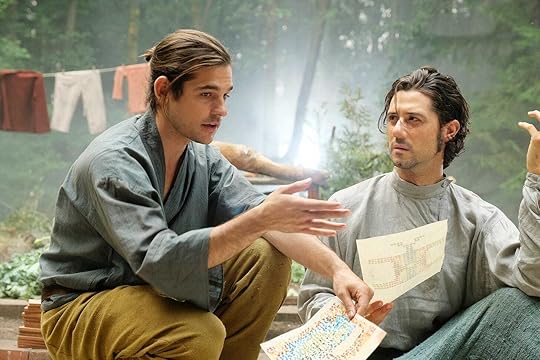
Highly recommend making a cup of hot cocoa (bonus points for dark chocolate, whole milk, a pinch of salt, and a healthy dash of bourbon-based vanilla extract) and watching, or rewatching some of the best episodes. Especially if you choose to watch A Life in the Day. Peaches and plums, peaches and plums.
That’s it for me— I hope you all have a magical week!
~Gemma
Introducing... Gemma Tate: Books, Writing, and More
Welcome! If you’re new here- hi! I write under the pen name Gemma Tate, and if you’re here then you might like my books. I write mostly romance, but also some dark academia mysteries and a great deal of fanfiction (which you can find HERE). Paid subscribers get more in-depth writing and book content, as well as sneak peeks, short stories, and bonus chapters each month. If you don’t want to be a paid subscriber that’s fine too! Unpaid subscribers still get a weekly newsletter that covers what I’m reading, what I’m writing, and a life/writing tip of the week.
July 24, 2022
I Don’t Mean to Be Alarmist: A Dayenu for the Modern Age
For the past several weeks, whenever I’ve talked with friends about the current state of the world, my first statement has been “I don’t know what to say.” I’m not actually convinced that that’s true—I know what to say about individual issues. I work in nonprofit communications and I have a graduate degree in history; I can quickly rattle off my historically- and personally- informed, educated thoughts on a few dozen hot-button political issues and policy initiatives. Where I struggle, I think, is to express the grand collective everything: the fact that nothing happens in a vacuum, and that when you add up the individual issues and look at it through a big-picture lens, the downfall of democracy and of life as we know it seems imminent and yet also, given history, inevitable. I say that I don’t know what to say, because I don’t know how to condense my outrage and fear and practicality and anxiety and frustration and even hope into words that go in the right order that fall into neatly ordered thoughts.
I keep returning to the phrase, “I don’t mean to be alarmist.”
I don’t mean to be alarmist, but a gun has more autonomy than I do in this America.
I don’t mean to be alarmist, but the highest Court this country has to offer is actively attempting a religious extremist coup, and they’re planning—not just contemplating the thought of, planning – to overturn the federal protections against voter suppression and election oversight.
I don’t mean to be alarmist, but as a Jewish bisexual woman who would like to wait a few years before having kids, I’m not convinced that I have a federally guaranteed right to safely be… well, any of those things. The overturn of Roe v Wade codified a Christian understanding of the relationship between life, conception, soul, and birth in a way that both my understanding of biology and my faith struggle to attach reason to.
And perhaps that’s part of the issue—I’m still searching for reason. There is, fundamentally, no political reason to try to outlaw condoms or hormonal birth control pills. Just like there’s no rational political reason to refuse initiative after initiative that could help the unhoused, just like there’s no rational political reason to deny the efficacy and validity of vaccines and medical research.
None, except to stick it to the Dems.
Someone pointed out a while back that capital-R-Republicans, particularly those who lean towards the cult of Trump and McConnell, think in “gotchas.” Their goal isn’t to make effective policy changes or to help—or even, God forbid, listen to—their constituents. It’s to hold on power, to make liberals or leftists or whoever angry, and to collect money. Those aspects of their policy-making decisions happen to manifest themselves in racist, harmful, problematic rhetoric, which in turn manifests in racist, harmful actions. I don’t know how to explain to these people that helping someone else doesn’t mean hurting yourself. That giving someone else power doesn’t necessarily mean taking yours away. And if it does, then that says something significant about what that power (im)balance was to begin with—that if giving someone else power means taking yours away, then maybe you shouldn’t have had so much to begin with.
But that thought process would require reason, and rationality, and empathy, and all three seem to be missing these days. Not just from politics—I think that’s what I’m struggling with the most. On the one hand, it’s the politicians, but I think it goes beyond that. It’s the fact that many white, straight cisgender people seem to willfully, intentionally lack the basic empathy required to acknowledge that not everyone shares their life experience, and that love and success and freedom might look different for other people.
Loving and affirming transgender children prevents suicide.
Providing safe, legal abortion access prevents suicide.
Vaccine mandates prevent millions of deaths and virus mutations that proceed to kill more people, endangering even those who did everything right.
Climate legislation prevents starvation, food deserts, and pollution.
Supplying time, money, and resources to the foster care system prevents both child abuse and suicide.
Gun safety laws don’t prevent people from killing people, but they sure as hell make it harder for guns to kill people.
Police and prison reform prevents murder, reunites families, and provides at least a semblance justice.
I’m not saying the Democrats have everything right. Frankly, I’m not convinced that anyone has anything right. But I don’t understand how half the country, and more than half of the electorate, can be so committed to refusing facts, law, logic, and the ability to understand what someone else is going through before making decisions based on money, rumor, and an uninformed gut feeling.
I don’t mean to be alarmist, but the United States of America is in a crisis of morality, and not the one that the religious right wants you to think.
Often, I’ve been reminded lately of bits and pieces of Jewish prayer, scraps of verse that flit through my head on long days.
Shemah. Listen. Hear. Understand.
Ufros aleinu sukat sh’lomecha, V’tak’neinu b’eitza tova mil’fanecha, V’hoshieinu l’ma-an sh’mecha. V’hagein ba-adeinu, v’haseir mei-aleinu, oyeiv, dever, v’cherev, v’ra-av, v’yagon. Save us, shield us. From enemies, plagues, swords, famine, sorrow. Protect us.
Um’sadeir et hakochavim b’mishm’roteihem barakia kirtzono, God has arranged the stars and the universe in their courses according to some greater plan.
But a different verse keeps finding its way back into my head, half-unwanted. Dayeinu. It would have been enough.
If women’s rights and marriage equality had been codified into law through amendments and legislation, not through court decisions. Dayenu.
If regular testing, hygiene practices, vaccinations had been mandated at the start, two years ago. Dayenu.
If climate legislation had been a priority over corporate greed. If gun monitoring, let alone control, had taken precedence over lining the GOP’s pockets. If impeachment processes were an option for Supreme Court justices who blatantly lied under oath to achieve their positions, if federal prosecution had been more automatic for the President who sought a coup. Dayenu.
This isn’t how we usually use the word. Typically, dayenu is reserved for the things we have, the things we’re grateful for. It would have been enough, by itself, had we only had our rightful access to self-determination, to the freedom of speech, to our religious practices and so on. But we have so much more than that—we have libraries, and books, and scholars who pass on their knowledge. Even that, dayenu, would have been enough,but we have even more than that—we have brilliant researchers and advocates and authors and thinkers and artists and poets, dayenu.
And don’t get me wrong. I am grateful for the things that I have and the circumstances under which I live. Hope hasn’t died, not for me, anyway. Not yet.
But I don’t mean to be alarmist has, in some ways, become my much-less-celebratory dayenu for the modern age. I repeat it, over and over. Each new item I attach it to makes the first few times I said it look so unbelievably tiny in comparison. I don’t know where it ends. I don’t know at what point we need to raise the alarms, light the beacons, call for help.
I’m a writer and a reader and a historian, so half the time I think in allegory. If this was (insert fictional universe here), then we’d be experiencing (insert drastic event that shapes the characters and the plot here).
If this was The Lord of the Rings, we’d be a cracking-apart Gondor calling for aid to a Rohan that doesn’t want to answer.
If this was Fahrenheit 451, the Hound would be on the loose and we’d have no place to hide.
If this was Star Wars, this would be the weeklong period of crumbling peace when the war gave way to mass murder and the rise of a fascist Empire. So this is how liberty dies: with thunderous applause.
We have so many fictional examples of what the fall of freedom looks like, yet we struggle to see it happening around us. We have so many examples of how to rise up, whether in thought or in action or in unionization, and yet when the time comes, we falter.
So when do we acknowledge that it’s time to be alarmist? When do we admit that we haven’t done enough? That reason, and rationality, and empathy might be the core of our rebellion, but that without action and active compassion, we’re not getting anywhere? At what point to we acknowledge that it isn’t getting better?
I don’t have all the answers. I don’t really have any. But I’m determined not to let complacency and hopelessness win out. If we’re still thinking in terms of fiction and hope, then how’s this: Rebellion is built on hope. Good, smart, empathetic people are working as hard as they can, to try and help, even just a little. People are organizing, unionizing, protesting, and even on a very small scale, it’s working. Maybe each individual effort isn’t enough to tip the scales, but each attempt moves the needle a little bit more. And for those saying it’s statistically impossible? Have another one: never tell me the odds.
May 3, 2022
If I Wanted the Government in My Body, I’d Have Fucked a Senator
I’ve written a lot about bodily autonomy and weariness on this blog. I wrote about it in 2016, when Donald Trump was elected and numerous people told me that I was overreacting. I wrote about it in 2019, when the Georgia 6-week abortion bill entered common discourse and hearing room floors. And now I write about it again, because of a leaked Supreme Court draft opinion that states an intent to overturn Roe v. Wade.
Contrary to what I’m sure conservative fearmongers might suggest, my worry is not because I am planning to have an abortion tomorrow, nor because I have an intent desire to wander around murdering babies.
I’d like to present and perhaps discuss a few simple facts.
Flat abortion bans, regardless of circumstance, privilege an unborn bundle of cells with neither consciousness nor sentience over the body carrying it.
Abortion bans in general, whether at six weeks or fifteen, are explicitly religiously biased. Abortion may be anathema to many or even most Christians. That’s fine. I have no objection to people not getting abortions. I am not telling anyone that they have get one, should they find themselves in a situation where it might be necessary.
Not everyone in the United States belongs to a religion that problematizes or criminalizes abortion in the first place. Judaism, for instance, indicates that life begins at first breath, not at conception. Even putting that aside, pikuach nefesh, the principle that values human life over nearly every other tenet of Judaism, would dictate that an abortion is not just an option for a woman with health concerns related to pregnancy or motherhood, it is a necessity.
Reproductive autonomy is a fundamental freedom.
Biological determinism is bullshit. Just because someone has a uterus does not automatically mean that they are a woman. Just because someone is a woman does not mean that they should be a mother.
Pro-life is not, currently, a concept that addresses poverty, food insecurity, children ripped away from their families and put in cages for the crime of existing on the wrong side of a fence. Health insurance and insulin are unaffordable, the foster care system is fundamentally broken, police brutality remains a significant issue, and the planet is in ecological crisis, yet it may be deemed a crime not to bring more children into a world that cannot sustain them. Overturning Roe has absolutely nothing to do with the value of life. It is about control.
There is no other law, to my knowledge, that only exerts its control over only fifty percent of a population with no repercussions for the other half. Furthermore—an unwanted pregnancy requires the act of impregnation, which would require both a person with a penis and a person with a uterus. Yet the person with a uterus is the only one who might face consequences for the crime.
The current makeup of the supreme court screams a certain reality: a man, particularly a privileged white man, can rape someone and end up on the Supreme Court bench. A woman cannot abort a fetus resultant from rape, but a doctor or nurse or friend can be deemed accessory to murder for helping her try.
I’m not here to preach about the morals of what to do with an unwanted pregnancy. I’m really not. If your God tells you that you can’t do it, that’s fine with me. It is your choice. But it doesn’t give you the right to tell me what to do with my body.
And let us be clear—a ban on abortions will not stop abortions. It will stop legal, safe abortions with medical oversight and safety regulations. It will stop poor people and disenfranchised communities from accessing safe, legal options for ending a pregnancy. Someone who, deep in their gut, does not want to be pregnant, will find a way not to be. They will poison themselves, throw themselves down the stairs, stab themselves in the belly, resort to coat hangers and back-alleys. If they cannot be, without being pregnant, then they will simply choose not to be.
When abortion is not an option, suicide is. This is murder, plain and simple.
I am particularly troubled by language like ‘longstanding tradition’ when it comes to the topic of Casey and Roe. The Roe v. Wade decision is not, in fact, longstanding. It was in 1973. That’s less than fifty years ago. That’s less than a fifth of the lifetime of the United States. And frankly, the U.S. is hardly a longstanding institution in comparisons to other countries—looking at this as a historian, I can say that 246 years is barely a blip in the radar. I think back to the slogans that people who defend Confederate monuments shout—they, too, speak of legacy and longstanding tradition surrounding institutions that rely on oppression. The Confederacy lasted for six years—less time than it takes to get through med school or college plus a master’s degree. That’s not a legacy or a tradition, that’s someone’s misbegotten fraternity years. Even this fight isn’t longstanding, not yet, not in the grand scope of history.
Our foremothers are our grandmothers and our mothers. The people who fought this fight first are still with us, still here.
I don’t think we get to be the weary ones about this.
I adamantly refuse to believe that a leaked memo means the end. 70% or more of Americans oppose a total abortion ban– in every state. There are protests to attend, funds to donate to, organizations that need resources and clinics that provide information in addition to services. And as much as I want to scream into the void until it’s all over, that’s not an option right now.
What I can do, what I’m trained to do, is research and educate.
I doubt that reproductive legislation stops with overturning abortion law. Plan B and regular birth control (whether that’s in pill, patch, shot, or ring form) is an imperative. I’d recommend getting a prescription, or at least stockpiling some emergency contraception that is shelf-stable (the Plan-B that I have a prescription for has a 5 year shelf-life). Mail-delivery birth control services are usually insurance-flexible and able to prescribe in many states. Some even deliver COVID tests and Plan B as well. Most are also cost-effective, even without insurance. All are well aware of the crisis headed their way.
Here are some resources and services that I’d recommend checking out:
Mail delivery birth control:
Favor (formerly the Pill Club, I had good experiences with them and they’re remarkably cost-effective for what you get)
Nurx
TwentyEight (this is what I use, they’ve been great)
SimpleHealth
LemonAid
PandiaHealth
Other organizations with helpful material (and lists of projects or places you can donate to, by state):
ACLU
Planned Parenthood
the Center for Reproductive Rights
March 14, 2022
Intentional Joy: Fear, Worry, and the Reconception of Normal
I don’t know how to write this.
Well, first of all, I guess I should say that I don’t know what ‘this’ is. A statement of inherency? A historian’s description of current events as our future’s history unfurls around us? Perhaps it’s as simple and complex as a Purim d’var Torah, or a manifesto I haven’t figured out how to live yet. I don’t know.
What I do know is this:
A little over two weeks ago, Russia invaded Ukraine.
A little over two months ago, rising debates about Antisemitism dominated nearly every conversation I had with Jewish friends.
A little under two years ago, this country shut down because of Covid-19.
The internet has been full of discourse about what is happening and why it’s happening and who’s to blame and how it’s happening and all of the chatter gets to be deafening, so I’ll admit that I’ve stopped reading the news quite as closely. But one word consistently seems to rise above the muffled shouts:
“Normal.”
People want to get back to normal. They want a life without a war shadowing every thought. A day without masks and concern that loved ones will die for breathing the wrong way, in the wrong place, at the wrong time. They want a day or a week where they don’t have to worry about being a hate crime statistic.
I want all of that too. I don’t talk about how much I want it, because when I do, a tight feeling rises up in my chest and I get a little pinprick behind my eyes. It’s more of a yearn than a want—a deep, desperate urge linked to the knowledge that in some ways, you can’t go home again.
So when I say what I’m about to say, please know that it isn’t because I want it to be like this.
But the fact is—and I’m saying this as someone with three bachelor’s degrees and nearly a master’s in what amount to studies of human behavior—this is normal.
I don’t just mean that it’s our normal now, though I think that’s a factor too. We’re already seeing that: even though my campus and workplace have lifted mask mandates in the halls, everyone wears them anyway. We are all trained to trust the science, and to trust the scientists, and we do—but the fear is still there. The habit to mask, to sanitize, to feel the burn of alcohol in the dry cuts that form when we wash our hands too often, may not go away. We link it to security—we’re doing our part, we’re protecting ourselves, we’re protecting our loved ones. Even when things are closer to the way we were, I think that habit may be hard to shake.
But we have been sanitizing and masking plenty of things, for longer than most of us care to admit.
I mentioned Antisemitism. The past sixty years (I could make an argument for forty, but that’s a different conversation, and also the subject of half my master’s thesis) have been quiet on this front. A synagogue shooting here. A bomb threat there. A dog-whistle comment in a Twitter thread most folks ignore. But no mass genocidal events in Europe. No calls for all Jews to die. Between the end of the Holocaust and the start of the 2016 Presidential election cycle was an unprecedented time of peace and quiet.
And it only seems to have lasted sixty years.
I brought a non-Jewish friend with me once, to a synagogue. We weren’t there for long—I just needed to run inside and drop off an envelope; I think I was trying to secure transportation for a Hillel trip or a youth group program. As we left, my friend commented on how pretty the big brick planters were out front. I didn’t have the heart to tell her that those planters aren’t simply decorative, that they’re a well-dressed blockade designed to protect the sanctuary inside from a car driving straight through the doors.
I wrote a poem, back in 2019, called “To the Daughter I May Never Have, a Poem You Will Never Read.” That poem contained the line, “I will have to explain the Holocaust/I worry that I will explain it while we live in its revival.”
If I were to rewrite that poem, I would phrase it differently. I would say, “I worry that I won’t have to explain it because we live in its revival.”
We have all borne witness to the ease with which insurrection, terror, and fear can grow in the woodwork when left alone to fester. We have all seen the dangers of giving a dog-whistle a microphone.
And yet.
This is also a world that assumes Jews are white, and therefore protected in the eyes of white supremacism. This is a world that defines Judaism as a religious difference and not a people with a history of persecution, that forgets that Jews have been forced to “pass” since before race became the black/white binary that the Transatlantic slave trade enforced. Race, as a term, has evolved. But from its very beginnings, the point has been to exclude. This is a world that rejects solidarity, because one struggle must be longer or more painful or less resolved in order to yell the loudest and maybe, finally, be heard.
This is, I fear, “normal,” too.
Certainly I think it was normal before the Holocaust shocked everyone into paying attention. Find me a longer-than-sixty-year period without major Antisemitic incidents. Try, please. I have two degrees in this. I have access to some of the finest research institutions in the world. I looked, and I failed. I think in some ways, the denial and the infliction of further pain are a return to normal cycles.
President Zelenskyy of Ukraine is Jewish. He is descended from Holocaust survivors. He lost family in the Holocaust. He is also fighting a war against a man who insists that a free Ukraine harbors a neo-Nazi regime.
In some ways, this is the new form of Antisemitism: calling Jews Nazis because “Nazi” has become a buzzword for “evil,” divorcing the term from its historical and political context. This is a painful subject, and not one that I plan to dig into at the moment.
Instead, I want to talk about something else. I want to talk about joy.
Intentional joy, even when the world is crashing down.
It’s worth noting that Mr. Zelenskyy does not campaign on his Judaism, nor does he reify its impact on his presidency much at all. He calls it an ordinary upbringing. And that’s the point.
You see, Jewish people have existed in times of turmoil and intentional extinction and genocide and horror since our inception. I have family who fled pogroms. Many of my friends have family who survived the Holocaust. This is the standard Jewish experience. The norm. We have all had what the Ukrainian president has called an ordinary upbringing. And watching him pick up a gun and stand among his people, watching young couples get married at night and go to war the next day, something hit me:
This is what it means, to fight. And at the same time, this is why it matters, to be intentionally joyful, even when the sky is falling and the earth’s on fire, and there’s no way out.
We have been doing this since the beginning.
There’s an old joke (and a song, by the talented Dave Nachmanoff): pretty much every Jewish holiday can be summed up by the words “they tried to kill us, we won, so let’s eat.” That’s what it’s about. There have always been dangers. There will always be dangers. We assess, we cry, we fight, we mourn. And we celebrate our survival.
The holiday of Purim is in three days. While I like to joke about it, calling it “drunk Jewish feminist Halloween” among my friends, I’m taking it a little more seriously this year. Kind of like how I took Hanukkah significantly more seriously right after the Charlottesville riots in 2016. It feels different, to celebrate intentionally, with the knowledge that there is a very loud group out there that doesn’t want you to. It feels different, to connect to a long history of ancestors who fought to celebrate survival.
I’ve been finding it harder than usual, to root myself in joy and to ground myself in the things that make life worth living. I’ve been getting lost in my own anxiety cycles, finding myself frustrated with how very pointless my day-to-day life can feel when these events spiral out of control all around the world.
It is that lineage of celebration and survival that keeps me grounded, these days.
It is a revolutionary act to find moments of joy.
As a Jewish woman descended from Jewish women who fled the pogroms and kept their songs and religion alive, it is not only my right to celebrate that survival, it is my duty. I speak from a place of privilege on this issue. I have a roof over my head, I have family that I can call and who are probably reading this post. I have friends who will listen to me ramble. I don’t express gratitude for my own circumstances enough. And I know that I won’t manage to feel like this every minute of every day. In all probability, I’ll keep feeling anxious and useless for twenty-three hours and fifty-five minutes out of every day. But if I can ground myself in that joy for even five minutes, well.
I’ll consider those five minutes worthwhile, and I’ll give those moments of happiness everything I’ve got.
—————————————————-
More resources on these topics may be found at the following links. I’m not an expert, just looking for a way to process. If you’re looking for ways to help, I urge you to do your own research, avoid the misinformation as well as you can, and figure out your own positionality in relation to these issues.
https://www.npr.org/2022/02/25/1082992947/ukraine-support-help
__ATA.cmd.push(function() { __ATA.initDynamicSlot({ id: 'atatags-26942-62308eb20e162', location: 120, formFactor: '001', label: { text: 'Advertisements', }, creative: { reportAd: { text: 'Report this ad', }, privacySettings: { text: 'Privacy', onClick: function() { window.__tcfapi && window.__tcfapi( 'showUi' ); }, } } }); });


